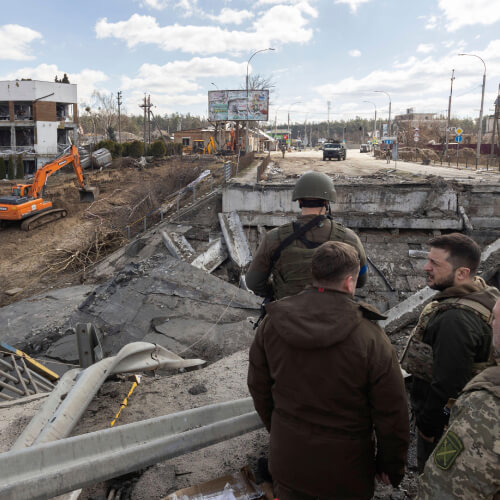
Two of the world's biggest 5G equipment makers – Finland's Nokia and Sweden's Ericsson – plan to fully exit the Russian market by the end of 2022. Most industry observers believe the move will likely shift all of Russia's future wireless networking needs to Chinese vendors like Huawei and ZTE.
Nokia and Ericsson suspended business in Russia shortly after the country invaded Ukraine. They recently have taken steps to make a complete and formal exit.
The equipment makers' actions come as Russia appears poised to buckle down on its military ambitions. According to the New York Times, Russian President Vladimir Putin recently ordered an increase in the size of Russia's military, which analysts believe signals the country's preparations for a long war in Ukraine.
Figure 1:  Russia's war on Ukraine shows no end in sight.
Russia's war on Ukraine shows no end in sight.
(Source: Ukraine President's Office/Alamy Stock Photo)
According to Reuters, Nokia plans to finish its exit from Russia by the end of the year. "We will retain a formal presence in the country until the legal closure is completed," a company spokesperson told the publication. Nokia counted about 2,000 employees in Russia prior to the invasion.
Ericsson, meanwhile, expects to gradually wind down business activities in Russia over the coming months, after previously suspending operations there. According to Reuters, Ericsson counted 400 employees in Russia and will take a $95 million financial impairment due to the move.
Ericsson and Nokia are not alone. Intel has suspended operations in Russia, while Cisco and Dell have exited the country. More broadly, many Western companies have sold their operations in Russia, according to CNN. For example, some former Starbucks retail locations have recently reopened under a new Stars Coffee brand.
Dell'Oro Group, a research company, estimated the combined share of Huawei and ZTE in Russia's market for radio access network (RAN) products to be 40% to 60%, with Huawei likely to have a bigger presence. That figure is expected to increase in the months and years to come as Russian network operators look to upgrade to 5G and other technologies.
Related posts:
— Mike Dano, Editorial Director, 5G & Mobile Strategies, Light Reading | @mikeddano
Read more about:
AsiaAbout the Author(s)
You May Also Like












